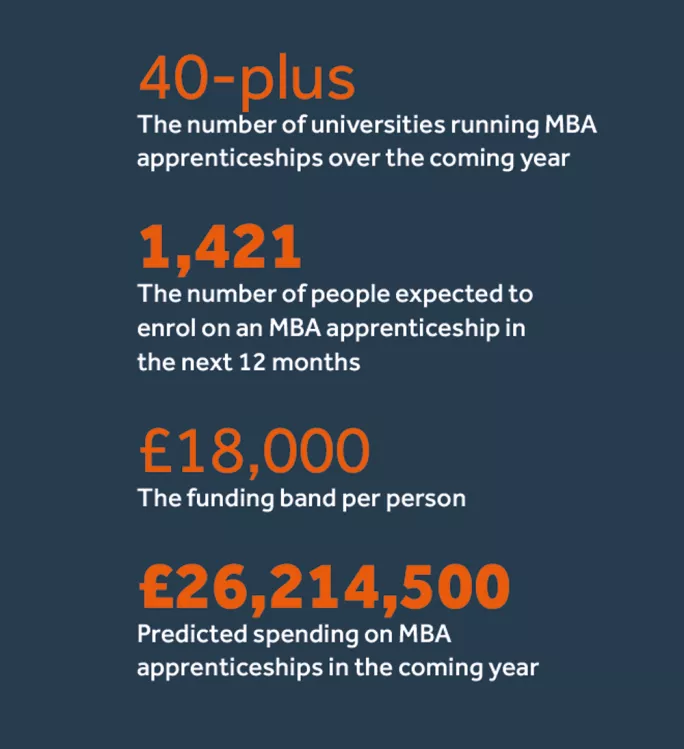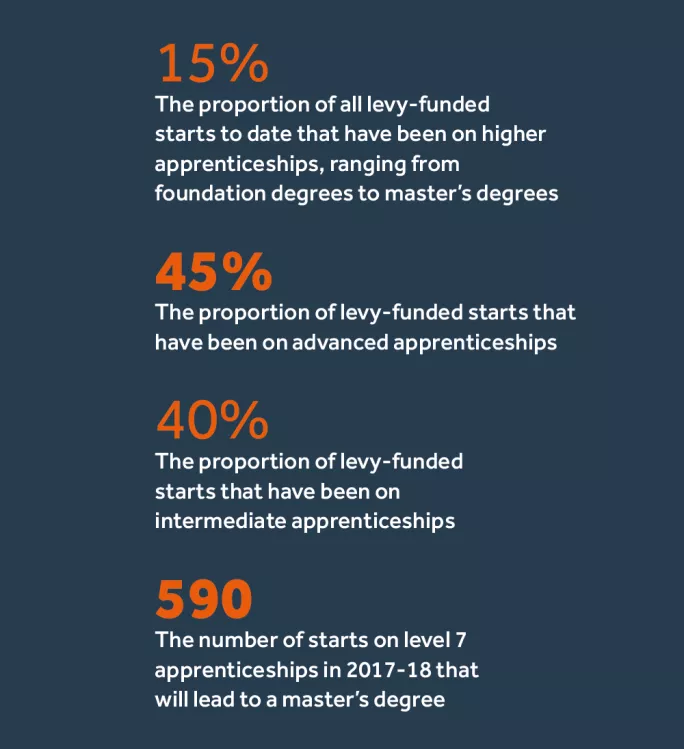‘It’s outrageous they’re abusing this loophole in the levy’

To many people, the word “apprenticeship” conjures up an image of a young person being given a job with training that will see them become a skilled worker.
However, a growing number of employers appear to view apprenticeships as something quite different - placing people already on the career ladder on to MBA programmes.
While the apprenticeships programme is designed to raise skills at all levels, business managers are absent from the list of shortage occupations identified by the government, including specialised roles in engineering, nuclear technology and digital skills.
The rise in the number of MBA apprenticeships is a major cause of concern to a number of leading figures in politics, education and business who fear that investing in enhancing the career prospects of people already established in work comes at a cost to those young people looking for their first job.
An investigation by Tes reveals that dozens of universities will be launching MBA apprenticeship programmes in the coming months, in response to demand from firms looking to spend their levy on polishing the skills of existing management. Companies ranging from investment management firm Charles Stanley to insurer Aviva, and organisations such as the Ministry of Defence, are already sending staff on MBA apprenticeships.
Verity Davidge, head of education and skills policy at EEF, the manufacturers’ organisation, comments: “It’s vital that the levy isn’t being used to simply rebadge training and education that employers would have been willing to pay for entirely out of their own pockets previously.”
Yet one MBA apprenticeship provider, Aston Business School, admits that it is helping companies to rebadge training as apprenticeships. A spokesperson for the business school says: “We are currently working with employers to enable non-apprenticeship executive MBA students to transition to the executive apprenticeship MBA.”
Almost half of the universities on the register of apprenticeship training providers have decided to provide MBA apprenticeships, with at least 40 courses scheduled to be up and running by this time next year. Many have yet to announce their new courses, having waited until the government recently confirmed the £18,000 funding band for MBA apprenticeships before formalising their plans.
Some 1,421 people are expected to enrol on the courses in the next 12 months, and universities are set to make millions out of the new programmes. Total revenues are projected to exceed £26 million in the coming year alone. This represents around £1 in every £100 raised by the levy this year.

The figures are from a Tes survey of more than 100 universities on the government’s register of apprenticeship training providers.
Most of the universities who have confirmed they will be running MBA apprenticeships have provided details of course fees and numbers of places available. Where these details have not been given, Tes has assumed a minimum of 10 places with the course charged at the £18,000 funding level payable through the levy.
But not everyone is jumping on the MBA apprenticeship bandwagon. The London Business School, where it costs £78,500 to undertake an MBA, has decided not to get involved.
A spokesperson explains: “Given the funding band that has been allocated to the standard, the school has decided that it is not currently feasible to do so.”
The use of the apprenticeship levy to send staff on MBA programmes is under attack by a range of critics, including Charlie Mullins, managing director of Pimlico Plumbers, who says: “Rather than having a proper apprentice or an apprenticeship for skills, they are just seeing a loophole and abusing it. It’s outrageous.”
He adds: “We have a massive skills shortage and now to allow people to get an MBA on it, we’ve got enough of them people about - half of these MBA people can’t even bang a nail in - we need people who can contribute something to the economy.”
His concerns are echoed by Jon Richards, head of education at the union Unison, who says: “The spirit of apprenticeships is being flouted by companies using government money to fund MBAs for staff who already have degrees.”
Former government adviser Tom Richmond, now senior research fellow at the Reform thinktank, adds: “MBA apprenticeships do not meet any historical or international definition of an apprenticeship because they are a form of professional development, not occupational training.”
And Sir Alan Tuckett, professor of education at the University of Wolverhampton, remarks that the Organisation for Economic Cooperation and Development “make clear our biggest skills challenges lie at levels 3, 4 and 5 - medium and high-level technical skills - and at entry, level 1 and level 2”. “MBA apprentices won’t help with either of these challenges,” he says.

The past year has seen a surge in level 7 apprenticeships, which lead to a master’s degree, according to figures provided by the Department for Education. There have been 670 level 7 starts since 2015-16, of which 590 have been in 2017-18.
The acceleration is set to continue with more than 30 MBA apprenticeships being launched in the coming months.
While MBAs are “valuable for people looking to accelerate their career progression”, the higher cost of these qualifications “makes them an easy way for employers, many of whom are struggling to spend their levy, to allocate these funds”, according to Ian Pretty, chief executive of the Collab group of colleges. “A key objective of the apprenticeship levy was to increase the proportion of young people undertaking an apprenticeship, but higher- and degree-level apprenticeships are overwhelmingly undertaken by older learners,” he explains.
The use of the levy to send staff on MBAs is expected to feature in a report on the economics of higher, further and technical education, which will be released by the House of Lords Economic Affairs Committee in the coming weeks. Former chancellor Lord Darling, a member of the committee, says: “The apprenticeship scheme and the levy was intended to drive up historically low skill levels in the UK. I don’t think it was ever intended to provide more MBAs.”
However, a shortage of management skills is contributing to poor economic productivity, according to Seamus Nevin, head of policy research at the Institute of Directors. “MBA apprenticeships are helping to tackle a key skills shortage,” he says.
Petra Wilton, director of strategy at the Chartered Management Institute, insists: “The new senior leaders’ master’s degree apprenticeship fully meets the spirit of the government’s apprenticeship reforms. It is an apprenticeship that has been designed specifically by over 50 employers of all sizes working collaboratively to meet a clearly identified management skills gap that is holding back firms’ performance and affecting UK’s wider productivity.” She sees the levy as “a skills investment plan that enables UK employers to access the higher-level skills and knowledge needed for their managers”.
A spokesperson for the DfE says: “We are implementing apprenticeship reforms to continue to improve the quality of apprenticeships at all levels…and through our reforms we hope to see a broad range of standards across sectors and occupations.”
You need a Tes subscription to read this article
Subscribe now to read this article and get other subscriber-only content:
- Unlimited access to all Tes magazine content
- Exclusive subscriber-only stories
- Award-winning email newsletters
Already a subscriber? Log in
You need a subscription to read this article
Subscribe now to read this article and get other subscriber-only content, including:
- Unlimited access to all Tes magazine content
- Exclusive subscriber-only stories
- Award-winning email newsletters